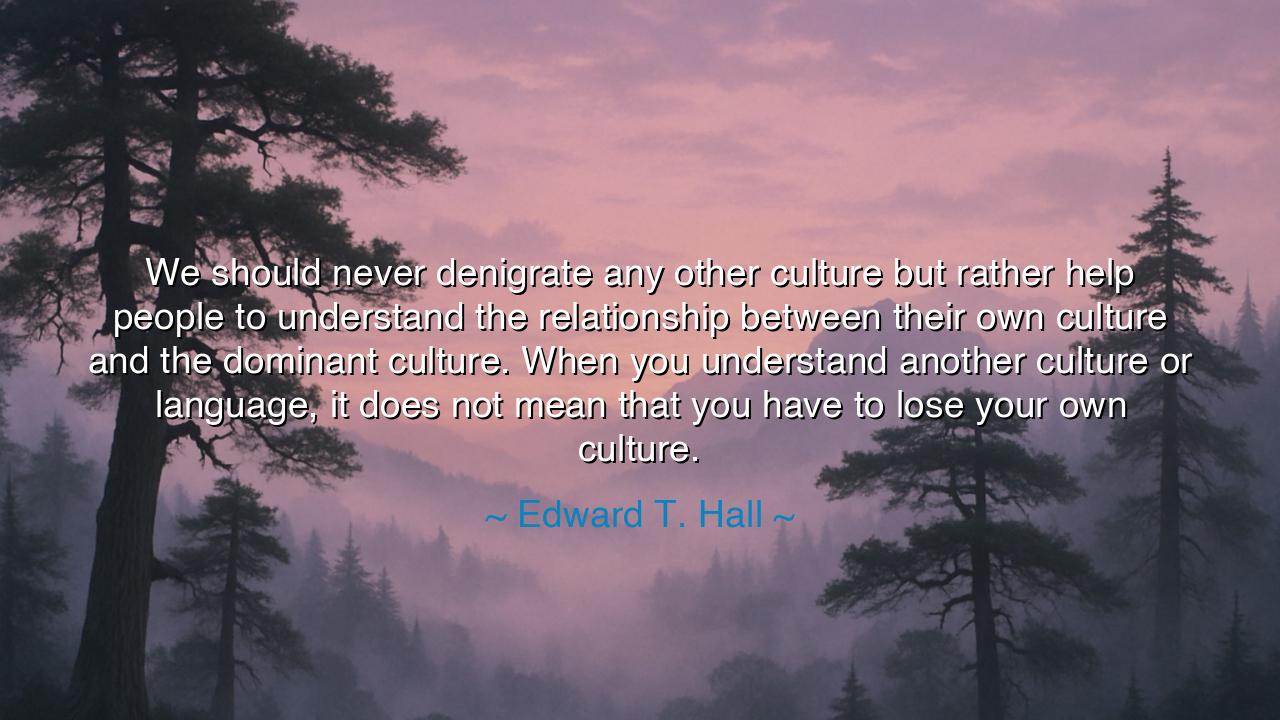
We should never denigrate any other culture but rather help
We should never denigrate any other culture but rather help people to understand the relationship between their own culture and the dominant culture. When you understand another culture or language, it does not mean that you have to lose your own culture.






The wise scholar Edward T. Hall once proclaimed: “We should never denigrate any other culture but rather help people to understand the relationship between their own culture and the dominant culture. When you understand another culture or language, it does not mean that you have to lose your own culture.” In these words he teaches the eternal balance between pride and humility, between honoring the self and respecting the other. For every culture is a living flame, and to extinguish one in favor of another is to diminish the light of humanity itself.
To denigrate another’s way of life is to close the gates of wisdom. Each culture carries with it the memory of ancestors, the rhythm of land and sky, the song of triumph and sorrow. When we look upon these treasures with scorn, we blind ourselves to truths that might enrich our own spirit. Thus Hall counsels us not toward division, but toward understanding, for in the weaving of differences arises strength.
The meeting of the dominant culture and the lesser-heard voice need not be a conquest, but a dialogue. It is in recognizing the relationship between them that one learns harmony. To see the threads that bind traditions together is to learn that difference is not a threat but an opportunity for growth. Just as rivers flow into the same sea without losing their source, so too can cultures meet without erasing one another.
Hall’s words also remind us that learning another language or custom is not betrayal. The wise may carry many tongues, many ways, and yet remain rooted in their own heritage. To understand another is not to abandon the self, but to deepen it, to broaden the horizon of the soul without cutting away its roots.
Therefore, let this teaching be passed on: embrace every culture as a teacher, and honor your own as a home. To understand another is to walk further along the road of wisdom, and to preserve your own is to remember who you are. In this balance lies peace among peoples, and in this harmony lies the enduring strength of mankind.






DSBang Do Sao
I love this quote because it emphasizes the value of cultural respect and understanding. It’s so important to teach people that learning about another culture doesn’t mean abandoning your own. But how do we ensure this message is communicated effectively, especially in a world where dominant cultures often overshadow others? How can we foster genuine cultural exchange where everyone feels valued and understood without fear of cultural loss?
QMNgo Quang Minh
Edward T. Hall’s point makes me think about how cultural integration often gets misunderstood. I agree that understanding another culture shouldn’t require losing your own identity. But how do we navigate the tension between holding onto our own cultural practices while respecting and learning from others? Can cultural diversity exist without the pressures of dominance and assimilation, or is there always an implicit power struggle in these dynamics?
PT12A8_22_Nguyen Vu Phuong Thao
This quote resonates with me because it highlights an important truth about cultural exchange. It's easy to become defensive about one's culture, especially when exposed to dominant cultures that can overshadow others. But how do we make sure that learning about another culture doesn’t lead to cultural erasure? Is it possible to integrate understanding and respect for both cultures without one diminishing the other?
LPLinh Pham
I really appreciate this perspective. In a world that’s increasingly globalized, we often fear that adopting other cultural practices or languages might diminish our own identities. But Hall’s quote reminds us that understanding another culture doesn’t equate to losing our own. How can we create environments where cultural exchange is viewed as enriching rather than threatening? Can we encourage mutual respect without forcing assimilation into dominant cultures?
MTPhung Minh Thuy
Edward T. Hall’s quote challenges us to think deeply about how we view other cultures. It’s easy to feel that embracing another culture means abandoning your own, but that’s not the case. How can we help people understand the relationship between their own culture and dominant cultures without feeling threatened by it? Is it possible to learn from others while maintaining a strong connection to our own heritage?